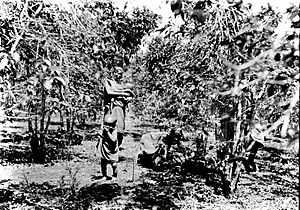Coffee production in Kenya facts for kids
The coffee industry of Kenya is very important to the country. It's known for its special system where farmers work together in groups called cooperatives. These groups help with everything: growing, preparing, selling, and even auctioning the coffee.
Most of Kenya's coffee, about 70%, comes from small farms. In 2012, there were around 150,000 coffee farmers in Kenya. It's thought that about six million Kenyans work in the coffee business, either directly or indirectly.
Coffee grows well in the high areas of central Kenya. The soil is acidic, and there's just the right amount of sunshine and rain. Kenyan coffee is known for its strong flavor, rich taste, and nice smell, often with hints of cocoa. High-quality Kenyan coffee is one of the most wanted coffees in the world!
However, coffee production has gone down. In 1987, Kenya produced about 130,000 metric tons. By 2011, this had dropped to 40,000 tons. This happened partly because land used for coffee growing was developed for buildings, and coffee prices were not stable.
Contents
History of Kenyan Coffee
Even though Kenya is close to Ethiopia, where coffee is believed to have started, coffee wasn't grown in Kenya until 1893. French missionaries called the Holy Ghost Fathers brought coffee trees from Reunion Island. They started farms near Nairobi, Kenya's capital city. These mission farms became the main places where coffee growing began in Kenya. Some sources also say the British introduced coffee around 1900.
In 1933, the Coffee Act was passed. This law created the Kenyan Coffee Board. It also made sure that coffee was sold in Kenya itself. Later, in the early 1950s, a plan called the Swynnerton Plan was introduced. This plan helped families have small farms where they could grow food for themselves and also grow cash crops like coffee to earn extra money.
What is Kenya AA Coffee?
You might have heard of "Kenya AA" coffee. This isn't a type of coffee, but rather a way to classify it. All Kenyan coffee is sorted after it's prepared. Coffee beans are graded based on their size.
Beans that are 17 or 18 (which means 17/64 or 18/64 of an inch) are given the grade AA. These are usually the largest beans. Many people think a large bean size means high quality. But it's important to remember that bean size is just one of many things that make coffee high quality.
Selling Kenyan Coffee
Kenyan coffee is sold once a week at the Nairobi Coffee Exchange. This is a special place where buyers bid on coffee. It's located at The Wakulima House in Nairobi.
The coffee is packed in large bags, each weighing 60 kilograms (about 132 pounds). However, buyers make their offers for every 50 kilograms (about 110 pounds). The prices for coffee can change a lot depending on the grade and how much buyers want it. For example, AA grade coffee usually sells for a higher price than other grades.
Places Where Coffee Grows
Many farms and groups work together to grow coffee in Kenya. Here are some notable ones:
- Gikanda Cooperative Society (with Gichathaini, Kangocho, and Ndaroini Factories)
- Kirimiri (Thika)
- Kibirigwi Farmers Cooperative Society (Kirinyaga)
- New Gikaru (Nyeri-Mukurwe-ini)
- Tekangu Cooperative Society (with Tegu, Karogoto, and Ngunguru Factories)
- Thiriku Farmers Co-op Society (Thingingi Area, Nyeri)
- Iyego Farmers Cooperative Society (with Main, Mununga, Gatubu, Marimira, Gitura, Kirangano, Watuha)
- Karunguru coffee estate (Juja Kenya)
- Othaya Co-operative Society (Othaya, Nyeri)
- Rung'eto Farmers Co-operative Society (with Kii, Karimikui, and Kiangoi Factories)
- Baragwi Farmers Co-operative Society (with Karumandi, Kianyaga, Gachame Factories)
 | Sharif Bey |
 | Hale Woodruff |
 | Richmond Barthé |
 | Purvis Young |


